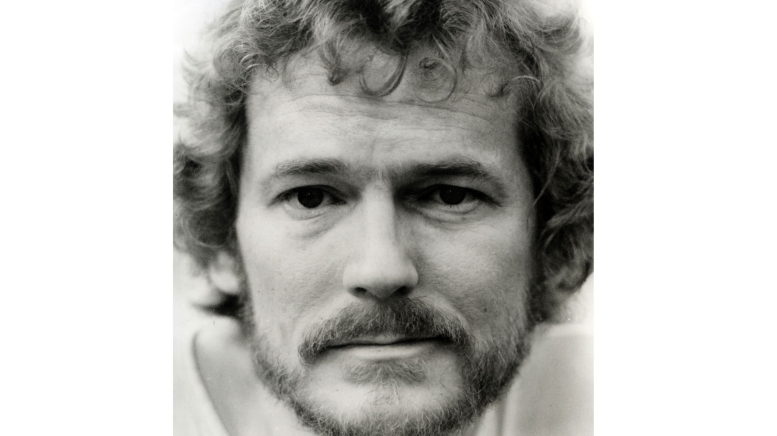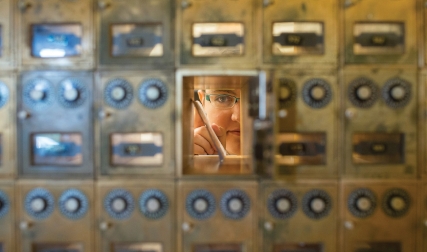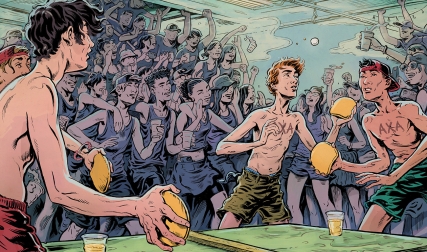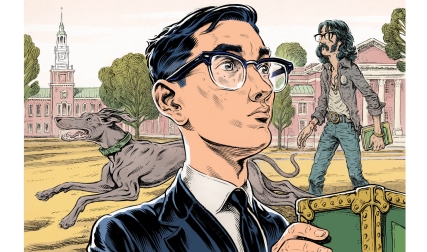By Art Beaver ’75, Bob McKernan ’74, Bill Dunbar ’74, Hal Macartney ’75, Joey Yastrow ’75, John Kilmartin ’75, John Elsenhans ’74, Peter Grose ’75, Jim Regan ’74, Steve Johnson ’75, Bruce Stuart ’74, Bob Sullivan ’75, and Dave Dunbar ’75 (AKA Artie, Big Mac, Big Swoop, Hal, Hooter, Killer, Melon, Piero, Reegs, Stevie J, Stuey, Sully, and Swoop (aka Swoop II)
1. Hi guys. Deep sympathies to our Canadians Swoop and Stuey on Gordon Lightfoot’s passing. I fondly recall evenings at the Tavern downstairs at the Hanover Inn for our Heorot off-site Emergency Officers Meetings, or whatever we euphemistically called them so we could dip into the frat’s funds for a pitcher of beer, de facto stealing from our absent brothers while proudly listening to Dave sing and play his Tavern set, with Canadian highlights being the usually a-cappella Joni Mitchell cut about being nuts and, especially, Gordo’s “Canadian Railroad Trilogy” . . . I’ve got Gord’s Gold on CD and will spin it tonight . . . Cheers, guys
2. Y’all read my thoughts this morning!
3. A couple of years ago Dave was over at our house and we talked about the [T]avern and brought out the guitar and sang the “Trilogy,” at least what we could remember of it. Great memories. Best to all you guys.
4. Hi, guys—
Yes, sad news indeed. Thanks for sharing your thoughts. This time it looks like Gord’s out for the duration. The reason I say that is because back in 2002 everybody thought he was a goner. An aneurysm put him in a coma for six weeks. His sister told the staff to play Lightfoot songs in the hospital room in hopes of bringing him back. He claimed that he came out of the coma when “Minstrel of the Dawn” was playing. A couple of years later he was back on the road.
The first concert I ever attended was Lightfoot’s performance at the Saskatoon Centennial Auditorium, the only classy venue in town. Bill and I performed there a year or so later as part of a city-wide high school talent show. No Lightfoot tunes. One Dylan song and “By the Time I Get to Phoenix,” with a violin accompaniment to wring some tears out of the mothers in the audience.
Anyway, the two Lightfoot tickets were a birthday present from my parents. It was November, probably 1969 or ’70. I took my girlfriend Shannon. Lightfoot had Rick Haynes on bass; lead guitar was Red Shea, from Prince Albert, Saskatchewan, which is not exactly known for producing studio quality musicians. The trio had been performing together forever, and they sounded fantastic to my young ears—you’d think there was a full band up there on stage.
Fast forward (or maybe not so fast) to 1973 and the Daily D interview with Gord backstage between shows in Spaulding Auditorium. Big thrill for me. He was promoting a new album, Sundown, which he said was “a real crackerjack.” He’d been around long enough to know a hit when he heard it. In a 2016 Vanity Fair article, when the interviewer asked Gord if he knew that certain songs were going to connect with his audience, he referenced the single “Sundown,” which he said he knew almost right away was going to be big.
The album sold a million units over the years, but my favorite Lightfoot album remains If You Could Read My Mind, which I bought back in the day under its original title, Sit Down Young Stranger. The first track is the coma-defeating “Minstrel of the Dawn.”
In Spaulding, during the first show I believe he introduced his fellow musicians as his “cohorts,” which prompted a leather-lunged audience member to bellow “cohogs!” At least that’s how I remember it. Backstage between shows he asked me what that was all about, so I explained that some upperclassmen who matriculated at an all-male college weren’t fans of coeducation. He looked baffled and asked, “Why wouldn’t you guys want girls around?” I’m pretty sure that exchange never made it into the article.
He was wearing patched and ripped blue jeans, a jean shirt and cowboy boots. He asked if I minded giving him a minute while he changed his wardrobe for the second show. What that entailed was digging in a battered suitcase and swapping his regular cowboy boots for white cowboy boots. Between boots I saw he was wearing kind of loose-fitting white sweat socks—sort of like the ones Steve Buscemi’s character is wearing in the film Fargo when his leg is fed into the wood-chipper. Some things you can’t unsee.
For those who are still reading, thanks for sending me down memory lane and for hanging out in the Tavern while I played Lightfoot songs. And thanks to Bill for playing Lightfoot tunes with me over the years, including an impromptu, late-night duet on “Steel Rail Blues” after the wedding here in LA!
RIP, Gord.
5. I was fortunate to see Gord in concert four times: the first of the two November 1973 concerts in Spaulding that David cited; in the Kennedy Center Concert Hall in October 1975; at DAR Constitution Hall, also in DC, circa 1981; and on July 1, 1991 (Canada Day) at the Ravinia Festival in Highland Park, near Chicago. He was the best. I still listen to him often on Spotify, having dumped my vinyls and CDs along the way. Too many great songs to mention . . . But I really like the sound of his medley of “For Lovin’ Me” and “Did She Mention My Name.” The documentary of his life that a few of us discussed a few years ago was terrific. Best to all.
6. Guys, just a footnote that I wanted to share in what has become, for me already, a fine example of a Postmodern Electronic Wake among Old Friends. I read this interesting article just now about the Edmund Fitzgerald song. Certainly, the Dunbar bros., and you, Stuey, know these facts by heart, but for us Yanks, it’s possibly useful and interesting. There’s also a video clip embedded and links to other Gordo articles. Swoop: It could have been YOU who was the 1970s student-journalist who became his dear friend and later co-wrote a song with him! The value of staying in touch . . . https://www.nytimes.com/2023/05/02/arts/music/gordon-lightfoot-edmund-fitzgerald-song.html
7. Add my condolences. First saw him live at Dartmouth. I think he had some opening act that he made a snide remark about as he opened his show. Don’t quote me but I think Gordon may have had a few before he came out. Was still a great show. I managed to see him a couple more times when he made his regular stop in Duluth.
8. One footnote to add to these footnotes.
Swoop, with regard to the earlier discussion of you and Bill performing in the Hanover Inn Tavern, I seem to recall one Robert Gordon “Purple” Hayes ’74 singing with you all. Don't know if he was a regular with you or sat in occasionally but I remember seeing Purple perform somewhere. He was an accomplished singer with a smooth baritone.
As an aside, in the year after our graduation, Purple and I kept in touch (by snail mail) as we were both in Europe. Over the New Year holiday (1974-75) I took the train from Italy up to Langenthal, a small town in the middle of Switzerland, where Purple played [ice hockey] for the local team. I stayed with Purple and his then wife (Merrie ?) and attended one of his games. The Langenthal team played at night in an outdoor rink, around which the whole town gathered. The atmosphere was akin to Davis Rink without a roof. Purple was the star of the team and the crowd would chant "Boabee, Boabee" when he got the puck. When we walked through town, kids would ask him for his autograph and
everyone greeted him. RIP Purple.
9. Hi, guys—couple of more notes:
Stevie J, you mention Lightfoot’s terrible opening act at Spaulding. This morning, when I woke up, the first thing that popped into my head was the name of the band—Gunhill Road, which is also the name of a major thoroughfare in the Bronx and an odd handle for a group from Mount Vernon, NY.
Anyway, as I recall, the snark from Lightfoot came when he said let’s hear another round of applause for the opening act (or some such) and called them “Dunghill Road.” As for Lightfoot’s sobriety, he did admit later, after he'd quit drinking, that he was hitting the sauce pretty heavily in the ’60s and ’70s, but he seemed as sober as a judge when I interviewed him between shows.
Reegs, thanks for those memories of Purple in Switzerland. I think his wife’s name was Mary Lynn (right, Bill? Stuey? Not sure of spelling). And, yes, Purple did perform from time to time in a group Bill and I put together with bassist Cameron Jones ’75, who went on to [the] Thayer [School of Engineering], where he helped develop the Synclavier, an early digital keyboard. Brilliant guy.
We called the band Saskatoon (I know, I know, but at least we didn’t spell it Saskatune.) At the risk of looking like a total packrat, here’s our business card. We played during fraternity cocktail hours mainly. Purple did have a good voice, as anyone who heard him sing along to the Heorot jukebox can attest.
To further confirm my pack-rat status, I’ve attached a photo of my yellowing, crumbling review of the Lightfoot concert that I dug up from a box in the closet—The Dartmouth, Monday 19, November 1973. (No idea why the paper used a date slug in that way.) The review is kinda cringeworthy but not as irredeemably awful as I had feared. I just hope I wasn’t the one who came up with the, um, uninspired headline. Also, if Wikipedia is to be trusted, I misspelled the warm-up band’s name as “Gun Hill Road.”
One final theory on that: Apparently, I enjoyed the warm-up band, and so did the audience, since they asked for not one but two encores. Maybe those are supposed to be reserved for the headliner. So, who knows, maybe Gord was a bit miffed at being upstaged, hence the “Dunghill Road” dig? We’ll never know.
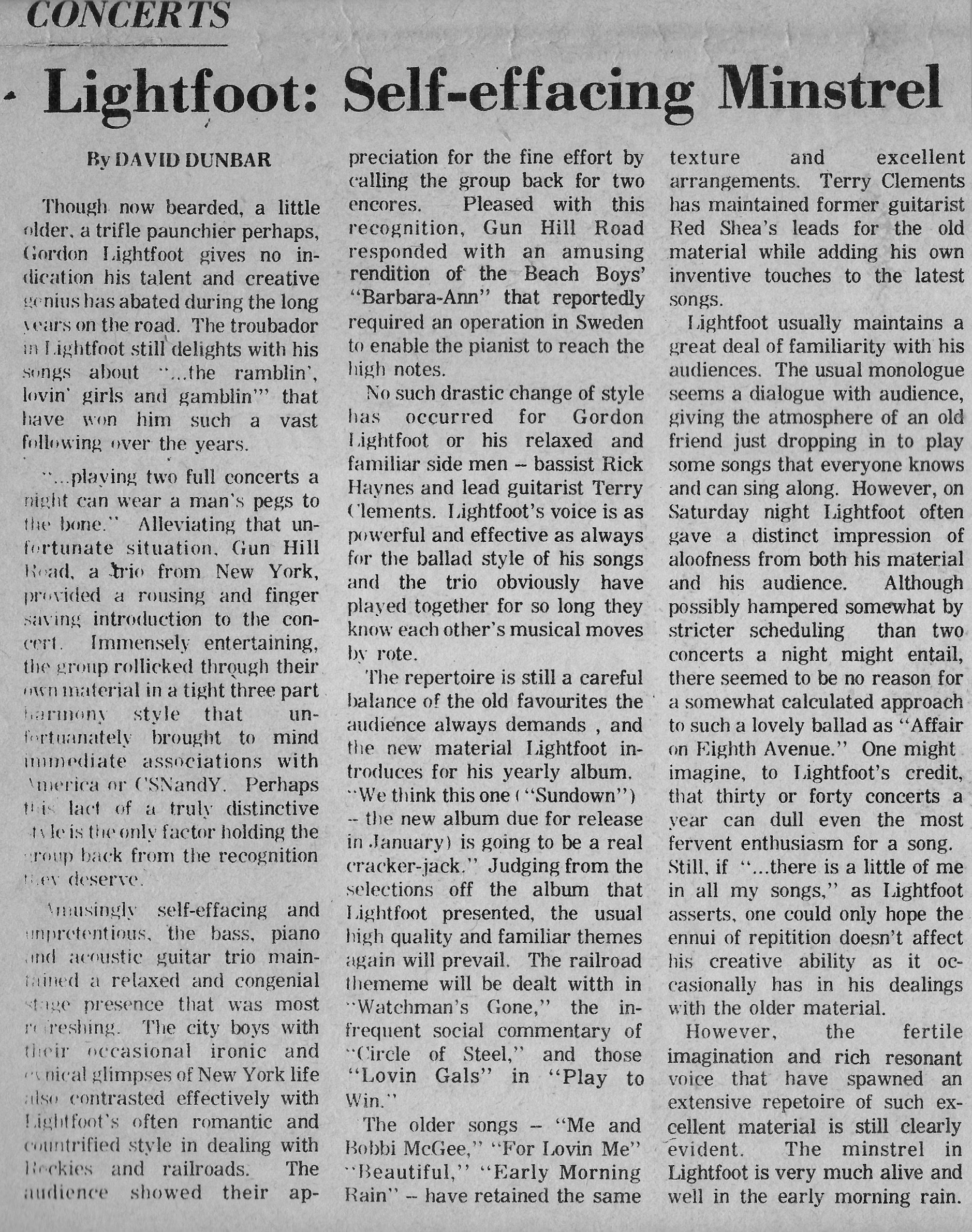
10. Last thoughts on Gunhill Road: I think Gord may have been a little miffed at the reception the audience gave them. That Beach Boys encore, “Barbara Ann,” didn’t quite fit his singer-songwriter persona. How was he going to follow that? Wonder if they ever opened for Gord again? Maybe they would have been great on the front porch of Heorot—or not.
11. Ah yes, “Saskatoon”—brings back some fond memories for me, playing at various cocktail parties, lugging our equipment in a shopping cart down to Spaulding to practice, being hired to play at an Edmund Muskie rally (now that was really weird!). David, you forgot our pitch perfect keyboardist, fellow ’74 Eric Van Leuven. And yes, I also recall Purple singing with us a few times, just as I recall Stuey’s dad, Ian (aka “Smiley”), enjoying “Alberta Bound” at our Holiday Inn bar gig!
Hockey and Purple: I also remember sneaking into Davis Rink late at night for a non-sanctioned skate in near darkness (courtesy of Howie Hampton). It’s a wonder no one got hit by a flying puck.
I hope this finds you all well and I look forward to seeing you ’74s at our 50th next year!
Take care.
12. Since we’ve mentioned the Davis rink, I happen to know a little history as my Dad played for Dartmouth in the late 40’s. He told me the way that they would make ice was to open the doors and windows to the chill winds. It had no artificial ice until the mid 50’s.
Can’t imagine having to do that today. It would be more like water polo.
13. I recall seeing photos of Davis with the doors and windows open. Killer, did your Dad play on teams with the legendary Riley-Rondeau-Harrison line?
14. Yes, he was a member of those teams. Rondeau (who was also from Providence) was a couple of years earlier though. One of the Riley brothers was a roommate. They lost two years in a row in the finals of the NCAA championship.
At [Coach] Eddie Jeremiah’s retirement banquet, he reminisced about many of his past players. He described [my dad] Jack as the best hockey player he ever had who could not skate! Hahaha.
15. Killer, I had no idea your father played hockey at Dartmouth—and during the early, glory years no less!
16. Nothing to add here except my father claimed he played hockey then, and thus may have known Killer’s dad. What a small world it is, if so.
17. Hal, I am going to assume he did know him, so a very cool a small world it is!
18. Killer, I just found this photo of one of the teams your dad was on, along with the guys who could skate. Check it out.
19. Sull, thanks for sending me that picture. It’s of the old ’48 hockey team. It reminded me of a story [my dad] had shared about two of his roommates from that team. In the photo you can spot Joe Riley [’48] and Dickie Desmond [’49], the goalie, in the lower left corner. Despite Dartmouth’s consecutive losses in the NCAA national tournament finals, Riley and Desmond were each named Most Valuable Player in the tournament, one year apart. The story goes that they had a little “ceremony” in their dorm room once they were back in Hanover. They moved the MVP trophy from one side of the mantle to the other, symbolizing the transfer of the title from Riley to Desmond. It must have been a sight to see.
20. More Davis Rink memories: Didn’t somebody dangle a rubber chicken over the wire at one end during warm-ups?
Duke Edgeworth saying “Hi, Dr. ke-MEE-ny” (his deliberately wrong pronunciation) through the chicken wire to the Prez, who sat behind our net.
Many more, I’m sure.
21. I never did step blade on Davis; I think Artie, Melon and I only laced skates for the annual Heorot night on Occom Pond. It used to freeze in those days. I do remember holding onto Swoop’s hockey stick over there and being pulled around—the only native Bay Stater in 200 years of Massachusetts history who couldn’t skate.
I know that the Alumni Mag has been archived and just thought to see if this was findable and it was (attached below). I send it not to belabor you guys but because there might be reminiscences in it. I haven’t dared re-read it—it was so long ago, like Swoop’s review, and probably petty bad. It was the first piece I was ever paid for anywhere, discounting 10-cents-per-column-inch for Chelmsford Newsweekly reports on our high school football games in 1969-70. That’s where I got in the habit of writing too long—I figured it paid better.
So, mea culpas aside, here’s a thing looking back at when Davis finally shuttered—hopefully with stories in it. I’ve loved reading all of your varied memories, from Dunghill Road to parents in NCAA championships. Just BTW, don’t diss nearby, tough-as-nails Mount Vernon NY re. Cultural Contributions—Denzel came from there!
How did Gordon Lightfoot start all this?? https://archive.dartmouthalumnimagazine.com/article/1976/1/1/farewell-dear-boozy-brawling-davis
22. Yikes—we have come a long way from Gordon Lightfoot to the Tavern to Purple Hayes to Davis Rink to my rum-drinking dad so I feel I must jump in here.
I last saw Purple in 1994 in Calgary (Mac, I remember the year only) and we got in a game of pool against a couple of Philadelphia Flyers and New Jersey Devils hockey players. Purple was holding court and I was buying the tequila shots. I never did see him again. Many more Purple stories out there and his wife’s name was Meri-Lynn Neideg (no idea why I remember that). He died of brain cancer in 2010. Dave Walkom ’73 and Jake Johnston ’73 had stayed in touch with him and filled me in at the last reunion. RIP Purple.
My best memories of Davis were the chicken wire where there is now [Thompson Arena’s] plexiglass, the wall at the end of the rink and walking into the rink fully dressed through the crowds, who got there an hour before us. A hockey player’s gauge for a good rink are the ice conditions which I remember as very good (Billy/Dave/Steve?) and of course I remember Hutch on the Zamboni (again, no idea why I remember that). Steve and I were linemates in the 100-year hockey celebration game in 2006, so played in Thompson as well.
The Tavern was great, too, and as I mentioned: Dave gave a little performance at my house when he visited a couple of years ago.
I have been listening to Gordon Lightfoot songs all day. “It’s so nice to meet an old friend and pass the time of day . . .” Even if it is just via email.
Hope everybody is aging well.
23. One last insight to share relating to a Gordon Lightfoot song which might be more than you ever wanted to know. On May 5th, 1981, Bobby Sands died in the Maze prison. Twenty-seven-year-old Sands had spent 68 days on a hunger strike. While in prisons, he wrote a poem called “the Voyage” about the 1803 Irish rebellion. Years latter this poem was put to the tune “The Wreck of the Edmund Fitzgerald.” It was the birth of one of the most famous of Irish rebel songs: “Back Home in Derry.”
24. Great to hear about all the Gordon Lightfoot stories along with those of our own musicians, plus Dartmouth hockey history. Much appreciated from one of the least music-literate Heorotians, and one whose hockey career only included playing on our championship intramural team.
I will say that in several visits to Lake Superior (Stevie J in Duluth and other friends right on the shore near Grand Marais), I could not get GL’s “Wreck of the Edmund Fitzgerald” out of my brain for days.
25. The only thing I can add to this memorable email chain is that Alexa can confirm that one of my top five requests over the last couple years has been: “Alexa, play the best of Gordon Lightfoot.”
